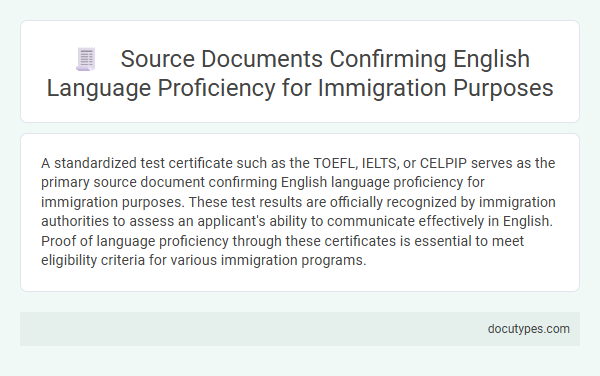A standardized test certificate such as the TOEFL, IELTS, or CELPIP serves as the primary source document confirming English language proficiency for immigration purposes. These test results are officially recognized by immigration authorities to assess an applicant's ability to communicate effectively in English. Proof of language proficiency through these certificates is essential to meet eligibility criteria for various immigration programs.
Overview of English Language Proficiency Requirements for Immigration
English language proficiency is a key requirement for many immigration processes, ensuring effective communication and integration. Various source documents can confirm your ability to meet these language standards.
- Official Test Results - Results from recognized tests like IELTS or CELPIP demonstrate English proficiency for immigration authorities.
- Educational Credentials - Completion of education in English-speaking countries often serves as evidence of language skills.
- Citizenship or Residency Documents - Previous immigration or citizenship certificates may confirm your English language capability.
Understanding acceptable source documents helps streamline your immigration application and meets language requirements effectively.
Accepted English Language Tests for Immigration Applications
English language proficiency is a critical requirement for most immigration applications. Immigration authorities accept specific standardized English tests as valid proof of language skills.
- IELTS (International English Language Testing System) - Globally recognized exam measuring listening, reading, writing, and speaking abilities for immigration.
- TOEFL (Test of English as a Foreign Language) - Widely accepted test evaluating academic English proficiency for visa applicants.
- CELPIP (Canadian English Language Proficiency Index Program) - Canadian-designed test accepted by immigration agencies to assess functional English skills.
Validity Period of English Language Test Results
For immigration purposes, English language proficiency is typically confirmed through standardized test results such as IELTS, TOEFL, or CELPIP. The validity period of these test results generally spans two years from the test date. Immigration authorities require applicants to submit results within this timeframe to ensure current language proficiency.
Alternative Evidence of English Language Proficiency
Immigration authorities require proof of English language proficiency to process applications accurately. Alternative evidence can be submitted if standard test scores are unavailable.
- Educational Credentials - Completion of secondary or post-secondary education conducted in English serves as acceptable proof.
- Employment History - Verification of work experience in an English-speaking environment demonstrates practical language ability.
- Official Letters - Letters from recognized institutions confirming English proficiency may be accepted in lieu of test results.
Exemptions from English Language Proficiency Requirement
The primary source document confirming English language proficiency for immigration purposes is an approved English language test result or a certificate from an accredited institution. Certain applicants may be exempt from this requirement based on specific criteria defined by immigration authorities.
Exemptions from the English language proficiency requirement often apply to applicants from predominantly English-speaking countries or those holding certain educational qualifications in English. Age may also be a factor, with younger and older applicants sometimes exempted. Additionally, applicants with recognized disability conditions impacting language testing may receive exemptions.
Documentation Guidelines for Test Score Submission
The primary source document confirming English language proficiency for immigration purposes is an official test score report from recognized language exams such as IELTS, TOEFL, or CELPIP. Immigration authorities require original or certified copies of these test results submitted according to specific documentation guidelines. Your test score submission must include authorized translations if applicable and meet the validity period established by immigration regulations.
Recognized Testing Centers and Institutions
Official source documents confirming English language proficiency for immigration purposes typically come from recognized testing centers and institutions. These documents include test results from exams such as the IELTS, TOEFL, and CELPIP, which are widely accepted by immigration authorities.
Recognized testing centers are authorized to conduct these examinations under strict standards ensuring the validity of your English proficiency results. Institutions providing these certifications must be approved by immigration departments or relevant government bodies to be considered legitimate proof.
Common Mistakes in Submitting Language Proficiency Documents
What source document confirms English language proficiency for immigration purposes? The most commonly accepted documents include IELTS, TOEFL, and CELPIP test results, which officially assess your English skills. Submitting these documents accurately helps avoid delays in the immigration process.
What are common mistakes in submitting language proficiency documents? Errors such as uploading expired test results, submitting unofficial score reports, or providing incomplete forms often cause application rejections. Ensuring your documents meet immigration requirements and are properly certified prevents unnecessary complications.
Verification Process for English Language Documents
| Source Document | Purpose | Verification Process |
|---|---|---|
| English Language Test Results | Confirm English proficiency for immigration applications | Certified test scores from approved tests such as IELTS, TOEFL, or CELPIP submitted directly to immigration authorities are verified through official test provider databases. |
| Academic Transcripts and Certificates | Evidence of education completed in English | Academic institutions provide authenticated transcripts or diplomas. Immigration officials verify documents directly with the issuing institution or through recognized credential evaluation services. |
| Professional Certification in English | Proof of professional experience using English language skills | Documents include letters from employers or professional bodies confirming English usage, verified by contacting the issuing organizations or through notarized statements. |
| Other Supporting Documents | Additional proof such as language training certificates or letters of recommendation | Reviewed and authenticated by immigration officers, often requiring notarization, translation by certified translators, and confirmation of authenticity. |
What Source Document Confirms English Language Proficiency for Immigration Purposes? Infographic

